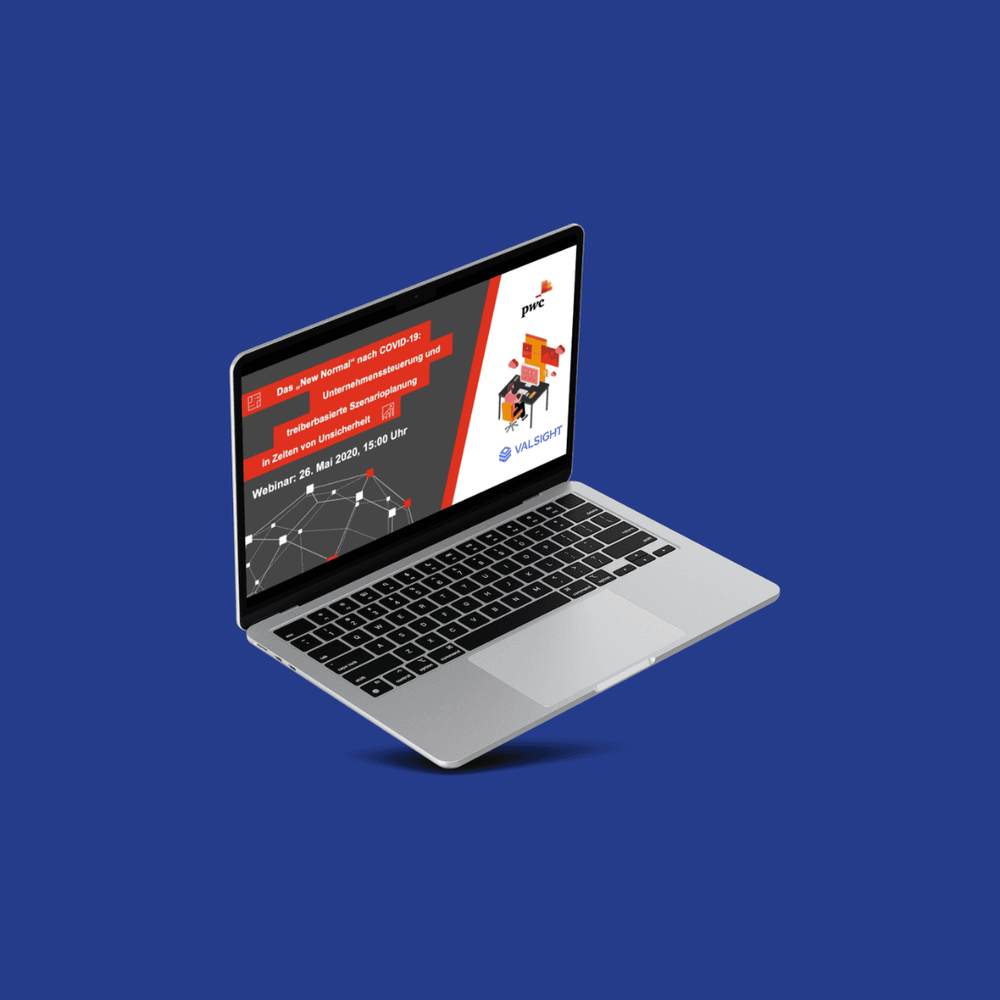Agile as the New Normal
Webinar with PwC – effective corporate performance management in times of uncertainty, available in German

The New Normal in Corporate Performance Management: Change as Usual
CFOs from companies in various industries have one thing in common: in financial planning, they are faced with new challenges resulting from the changed conditions caused by COVID-19. The questions revolve around topics such as short-time work, operational limitations like production outages, or volatile market prices. They reflect how quickly and comprehensively everyday life has changed within a few weeks: in companies, markets, and economies. How do CFOs confront a new normal where the framework for corporate performance management can change massively at any time?
This question is discussed in this webinar. One central insight: in today's volatile market environment, CFOs must set the right direction for their companies. How to achieve this? We have summarized three tips from our webinar.
Three Tips for More Planning Security in Corporate Performance Management
Tip 1: Flexibility – Develop and Re-Evaluate Agile Scenarios
"Now, the major disruptions in all industries are becoming evident. To emerge stronger from the crisis, flexibility is crucial: CFOs need to continually reassess the market situation and reliably deduce cause-and-effect relationships. This way, companies can remain capable of action even in times of rapid changes."
Gori von Hirschhausen, Partner, Finance Consulting Leader Europe at PwC
The economic environment in which companies operate today is characterized by dynamism. In his presentation, Gori von Hirschhausen describes current market challenges that are driving the field of controlling:
- Altered economic conditions affecting cash flow and revenue
- Increasing product margins, optimizing cost efficiency, and streamlining processes
- Business models undergoing transformation: Ensuring competitive advantage
- Meeting changing customer demands
- Tracking and reliably representing regulatory requirements
In this new normal, CFOs face the challenge of quickly assessing the impact of changing conditions and deriving actionable recommendations from them. This requires flexibility and a reliable methodology to agilely simulate and evolve forecasts and scenarios.
To achieve this, CFOs must shift their focus from controlling to the entire organization. In their role as strategic partners to CEOs, they set the direction for differentiated business decisions to secure liquidity. The difficulty lies in the fact that changes are hard to predict. So, how can agile corporate performance management be successful?
Tip 2: Transparent Financial Planning - Understanding Cause-and-Effect Relationships
"Companies need to be able to react faster in this increased dynamic environment. To seize new opportunities and identify risks, Finance teams must provide the right numbers at shorter intervals, enabling timely control. This requires appropriate reporting and planning processes, as well as corresponding tools that facilitate this."
Matthias Borstell, Sr. Manager, Management Consulting Finance at PwC
Given the new normal, FP&A processes are undergoing changes:
- Forecasts are updated at shorter intervals.
- Possible market developments are modelled in various scenarios.
- The effects of changing framework conditions are simulated in real time.
These changed processes present a valuable opportunity for companies: When company metrics are evaluated cross-departmentally at shorter intervals, better conditions for data-driven decisions are provided. It is now conceivable to regularly simulate various scenarios, illustrate their impacts, and utilize them for differentiated control.
A value driver-based planning approach supports the path to this transparency in planning: This methodology allows for transparently mapping cause-and-effect relationships and increasing the traceability and acceptance of planning in management. For example, it enables the simulation of which measures can be effectively employed in the context of COVID-19 for corporate performance management.
Tip 3: Using Data From the Past to Look Into the Future
"In every company, numerous data is generated daily, often left untapped. Accessing this knowledge from various departments is a crucial step towards effective business control. The bridge is formed by a specialized and user-friendly software solution that can be utilized even without IT expertise."
Martin Faust, Co-Founder & Chief Solution Architect at Valsight
Corporate data, which is generated daily, is described by Martin Faust as a "valuable knowledge base". Although they refer to the past, the data help to gain new knowledge for the future.
Special software solutions developed for modelling, simulation and visualisation of agile forecasts and scenarios make the knowledge usable. With them, cross-departmental data is collected centrally and prepared for comprehensive evaluations: automated and without costly Excel spreadsheets - ideal conditions for agile corporate performance management in turbulent times.
The video is only available in German.


